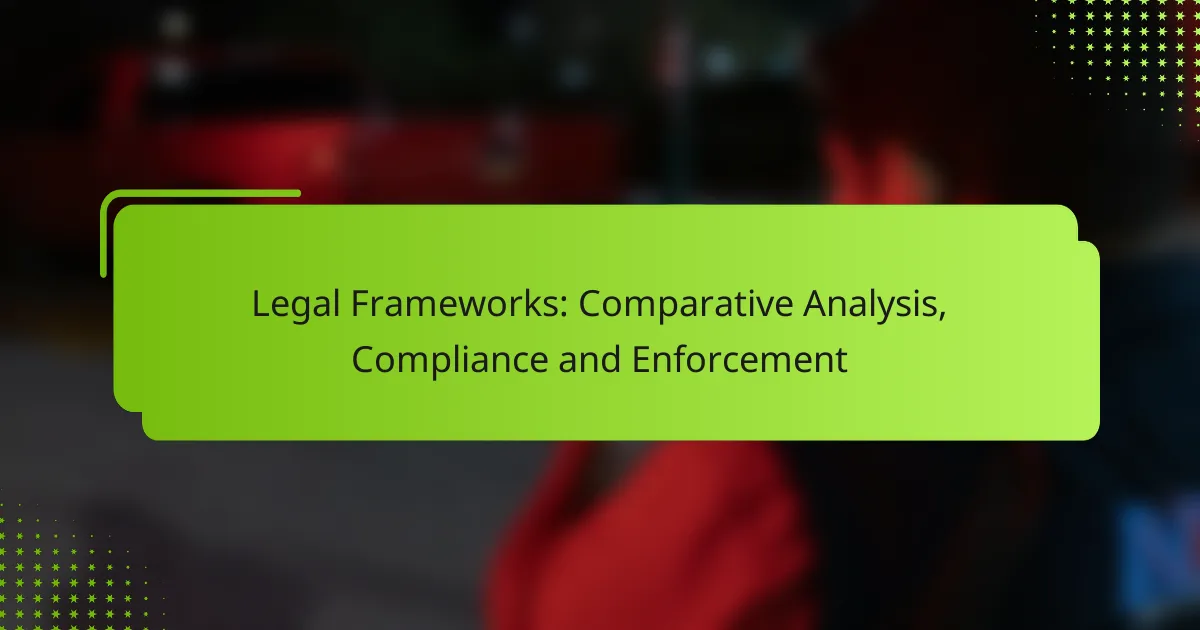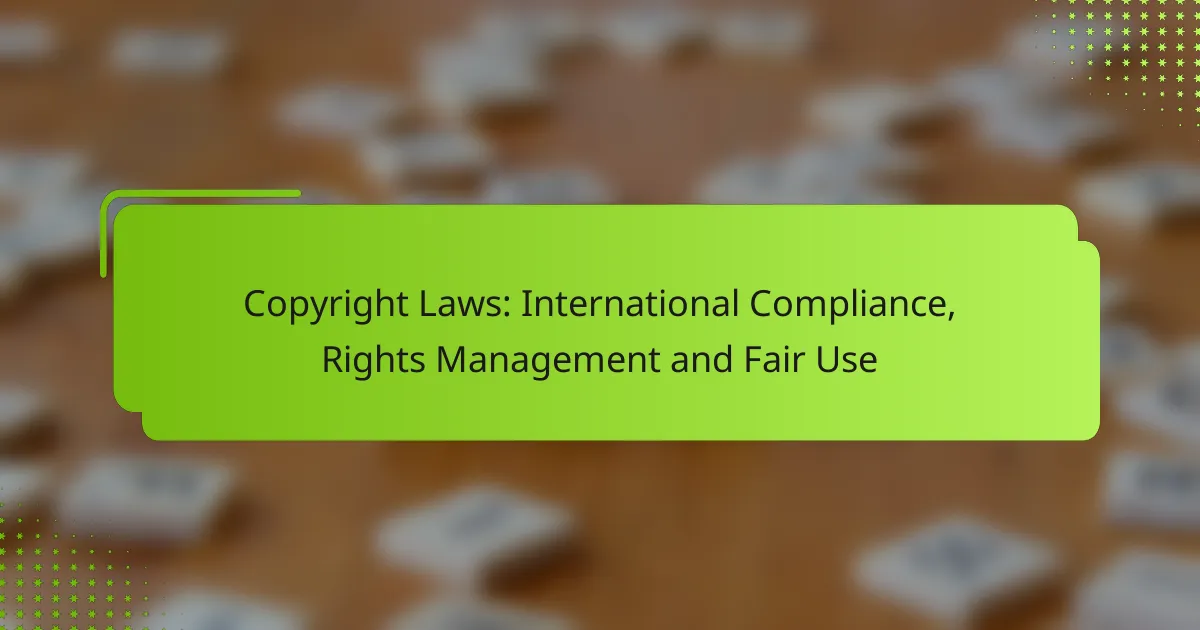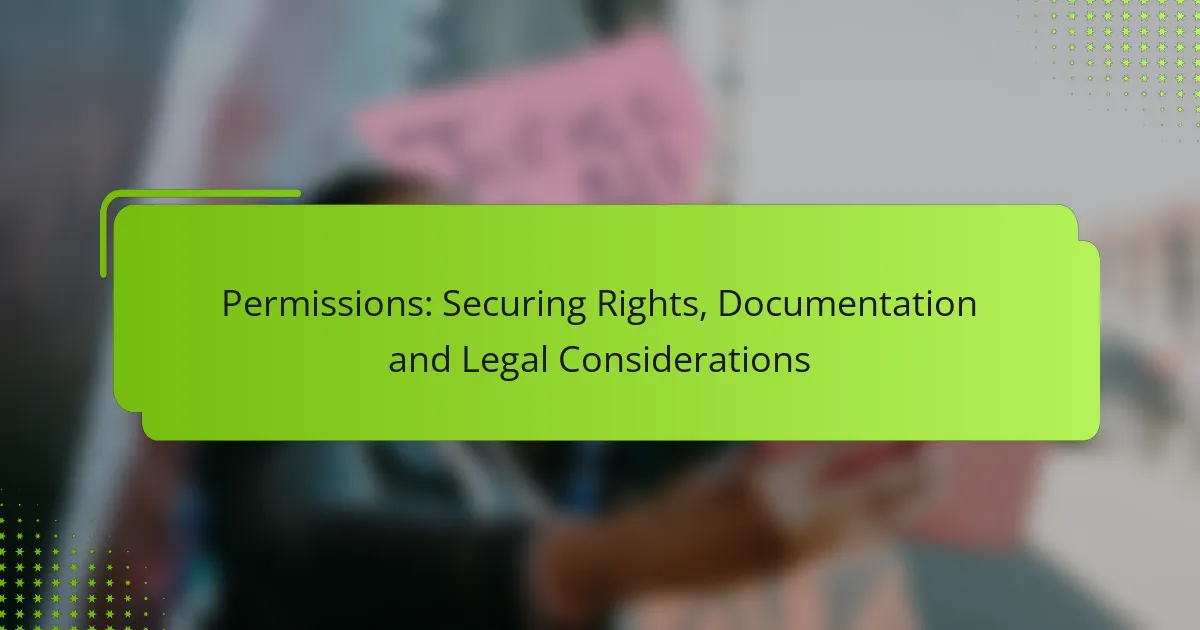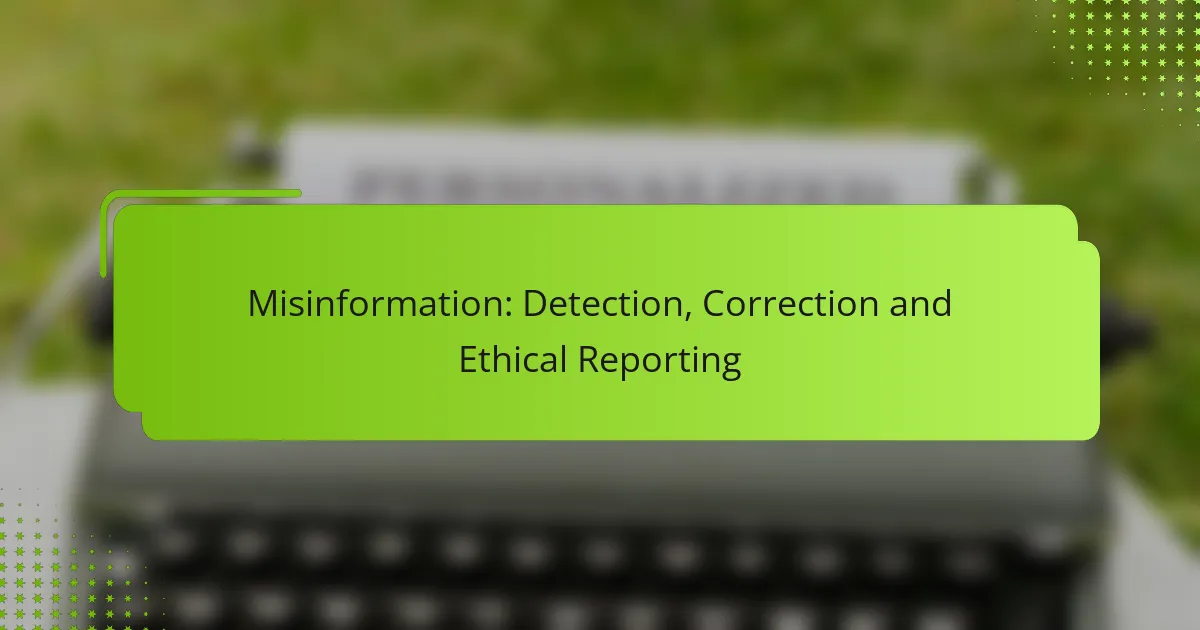Legal frameworks play a crucial role in ensuring compliance and enforcement across various jurisdictions, with distinct approaches evident in countries like the United States and the United Kingdom. In the U.S., a combination of federal laws, state regulations, and industry-specific guidelines establishes the compliance landscape, while the UK employs a structured enforcement strategy involving regulatory oversight and penalties for non-compliance. As organizations operate internationally, they must adeptly navigate diverse legal requirements and cultural contexts to mitigate risks and ensure adherence to applicable laws.
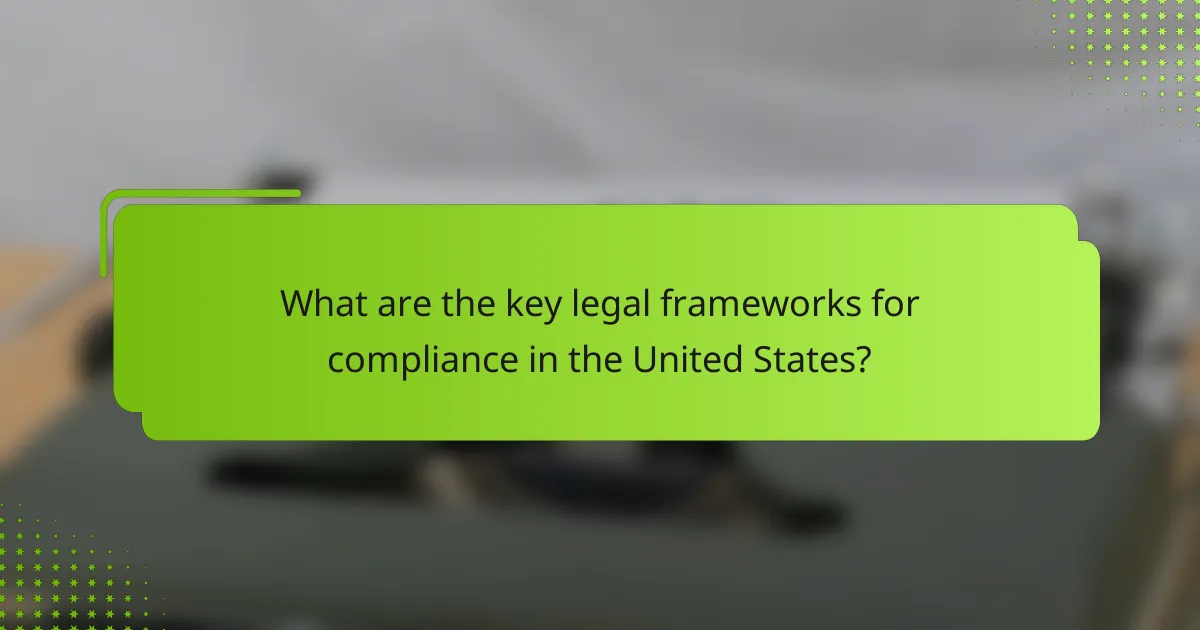
What are the key legal frameworks for compliance in the United States?
The key legal frameworks for compliance in the United States include federal laws, state regulations, and industry-specific guidelines. These frameworks establish the rules and standards that organizations must follow to ensure legal compliance and avoid penalties.
Federal laws
Federal laws set the baseline for compliance across the country and apply uniformly to all states. Key regulations include the Sarbanes-Oxley Act for financial reporting, the Health Insurance Portability and Accountability Act (HIPAA) for healthcare data, and the Federal Trade Commission (FTC) regulations for consumer protection.
Organizations must stay updated on these laws, as non-compliance can lead to significant fines and legal repercussions. Regular training and audits can help ensure adherence to federal standards.
State regulations
State regulations can vary significantly and may impose stricter compliance requirements than federal laws. For example, California’s Consumer Privacy Act (CCPA) offers more robust consumer protections compared to federal standards.
Businesses operating in multiple states should be aware of the specific regulations in each state they operate in. This often requires a tailored compliance strategy to navigate the complexities of differing state laws.
Industry-specific guidelines
Many industries have established specific guidelines that complement federal and state regulations. For instance, the Payment Card Industry Data Security Standard (PCI DSS) governs payment processing security, while the Federal Information Security Management Act (FISMA) applies to federal agencies and their contractors.
Adhering to these industry-specific guidelines is crucial for maintaining credibility and avoiding penalties. Organizations should regularly review and update their compliance practices to align with these standards, ensuring they meet both legal and industry expectations.
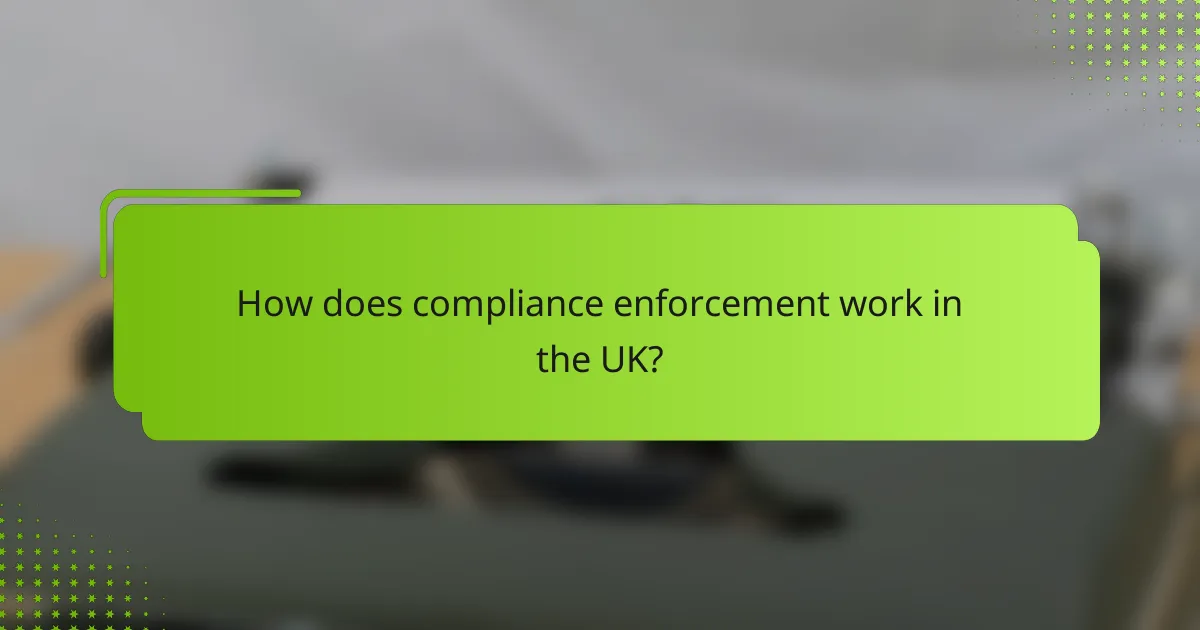
How does compliance enforcement work in the UK?
Compliance enforcement in the UK involves a structured approach where regulatory bodies monitor adherence to laws and regulations. This process includes inspections, investigations, and the imposition of penalties for non-compliance, ensuring that organizations operate within legal frameworks.
Regulatory bodies
The UK has several key regulatory bodies responsible for compliance enforcement, including the Financial Conduct Authority (FCA) and the Information Commissioner’s Office (ICO). These organizations oversee various sectors, ensuring that businesses adhere to financial regulations and data protection laws, respectively.
Each regulatory body has specific powers to conduct audits, issue fines, and take legal action against non-compliant entities. For instance, the FCA can impose significant fines on financial institutions that violate consumer protection laws, while the ICO can issue penalties for breaches of data privacy regulations.
Penalties for non-compliance
Penalties for non-compliance in the UK can vary widely based on the severity of the violation and the regulatory body involved. Fines can range from thousands to millions of pounds, depending on the nature of the breach and its impact on consumers or the market.
In addition to financial penalties, organizations may face other consequences such as restrictions on operations, mandatory compliance programs, or even criminal charges in severe cases. It is crucial for businesses to understand the potential risks and ensure they have robust compliance measures in place to avoid these penalties.
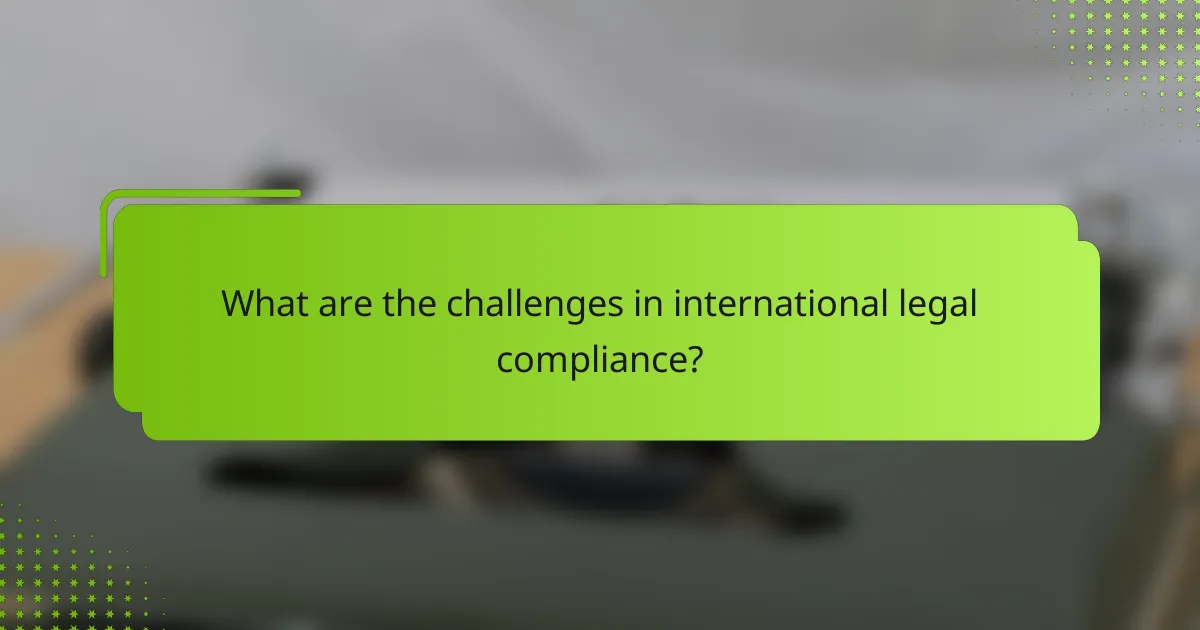
What are the challenges in international legal compliance?
International legal compliance presents various challenges, including differing regulations, enforcement mechanisms, and cultural contexts across jurisdictions. Organizations must navigate these complexities to ensure adherence to laws while minimizing risks and liabilities.
Jurisdictional issues
Jurisdictional issues arise when legal authority is unclear or contested across borders. Different countries have unique legal systems and enforcement practices, which can lead to conflicts over which laws apply in specific situations.
For example, a company operating in both the EU and the US must comply with GDPR in Europe while adhering to US regulations, which may differ significantly. Understanding the legal landscape in each jurisdiction is essential to avoid penalties and ensure compliance.
Cultural differences
Cultural differences can significantly impact legal compliance, as norms and values shape how laws are interpreted and enforced. What is acceptable in one culture may be viewed as non-compliant or unethical in another.
For instance, business practices such as gift-giving may be customary in some countries but could violate anti-bribery laws elsewhere. Organizations should invest in cultural training and local expertise to navigate these nuances effectively.
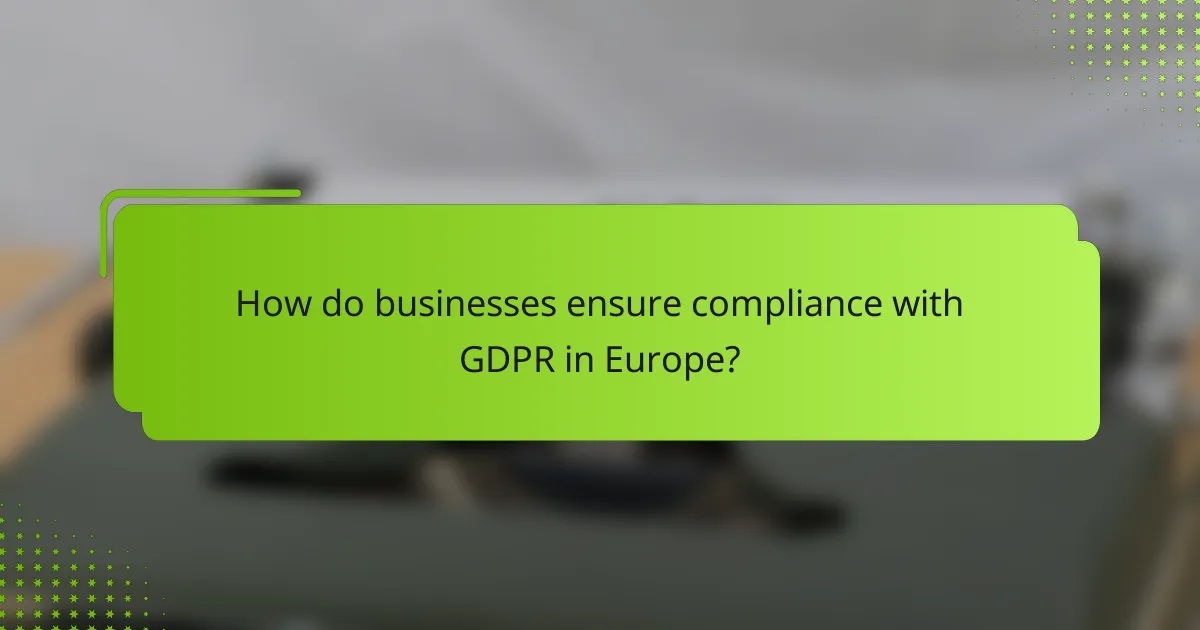
How do businesses ensure compliance with GDPR in Europe?
Businesses ensure compliance with GDPR in Europe by implementing robust data protection measures, appointing data protection officers, and conducting privacy impact assessments. These steps help organizations manage personal data responsibly and mitigate risks associated with data breaches.
Data protection officers
Data protection officers (DPOs) play a crucial role in ensuring GDPR compliance. They are responsible for overseeing data protection strategies, advising on obligations, and serving as a point of contact for data subjects and regulatory authorities. Organizations that process large amounts of personal data or sensitive information are typically required to appoint a DPO.
When selecting a DPO, businesses should consider candidates with expertise in data protection laws and practices. The DPO should be independent, adequately resourced, and report directly to the highest management level to ensure effective oversight and accountability.
Privacy impact assessments
Privacy impact assessments (PIAs) are essential tools for identifying and mitigating risks associated with data processing activities. Conducting a PIA helps organizations evaluate the impact of their data handling practices on individuals’ privacy and ensures compliance with GDPR requirements. Businesses should perform PIAs whenever they introduce new data processing technologies or processes that may affect personal data.
To conduct a PIA, organizations should follow a structured approach that includes identifying the data processing activity, assessing risks, and implementing measures to mitigate those risks. Regularly reviewing and updating PIAs is also important to adapt to changes in data processing practices and regulatory expectations.
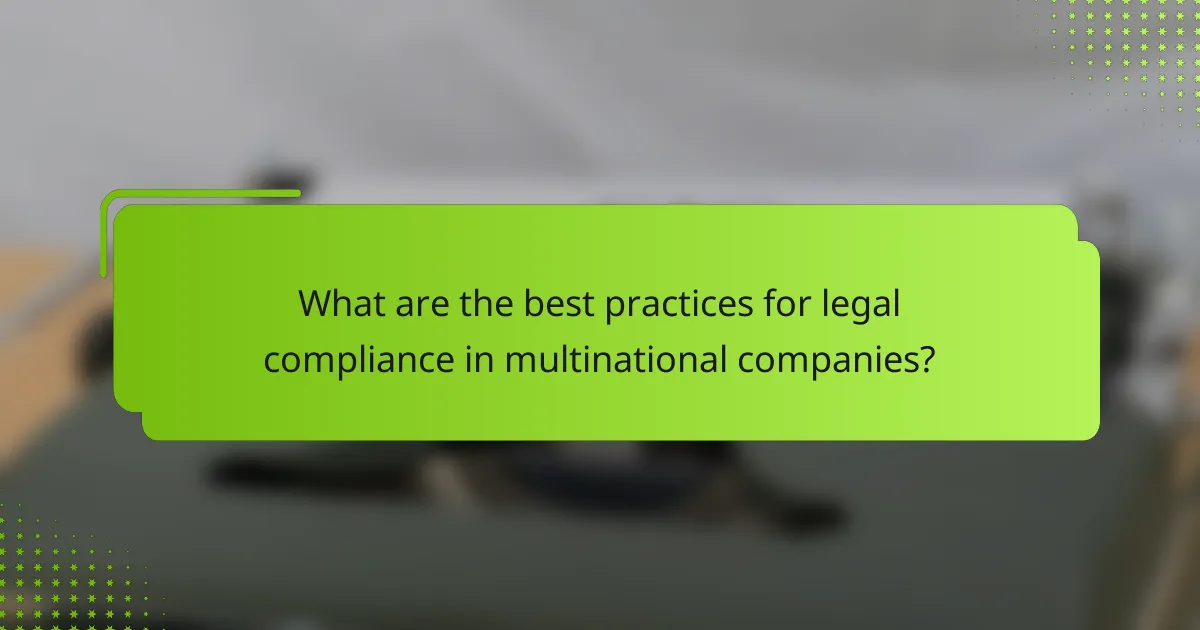
What are the best practices for legal compliance in multinational companies?
Best practices for legal compliance in multinational companies involve implementing standardized protocols, conducting regular training, and ensuring ongoing monitoring of compliance efforts. These practices help organizations navigate complex legal environments and reduce the risk of violations.
Standardized compliance protocols
Standardized compliance protocols are essential for ensuring that all branches of a multinational company adhere to the same legal standards. These protocols should be tailored to meet the specific regulatory requirements of each country while maintaining a consistent framework across the organization.
To implement effective protocols, companies should conduct a thorough risk assessment to identify potential compliance issues. This can include evaluating local laws, industry standards, and internal policies. Regular updates to these protocols are necessary to reflect changes in legislation or business operations.
Regular training programs
Regular training programs are crucial for keeping employees informed about compliance requirements and company policies. These programs should be designed to address the unique legal landscapes of each operating country and include practical examples relevant to employees’ roles.
Training should be conducted at least annually, with additional sessions offered as needed when regulations change. Utilizing a mix of in-person workshops and online modules can enhance engagement and retention of compliance information. Companies should also assess the effectiveness of training through feedback and testing to ensure employees understand their responsibilities.
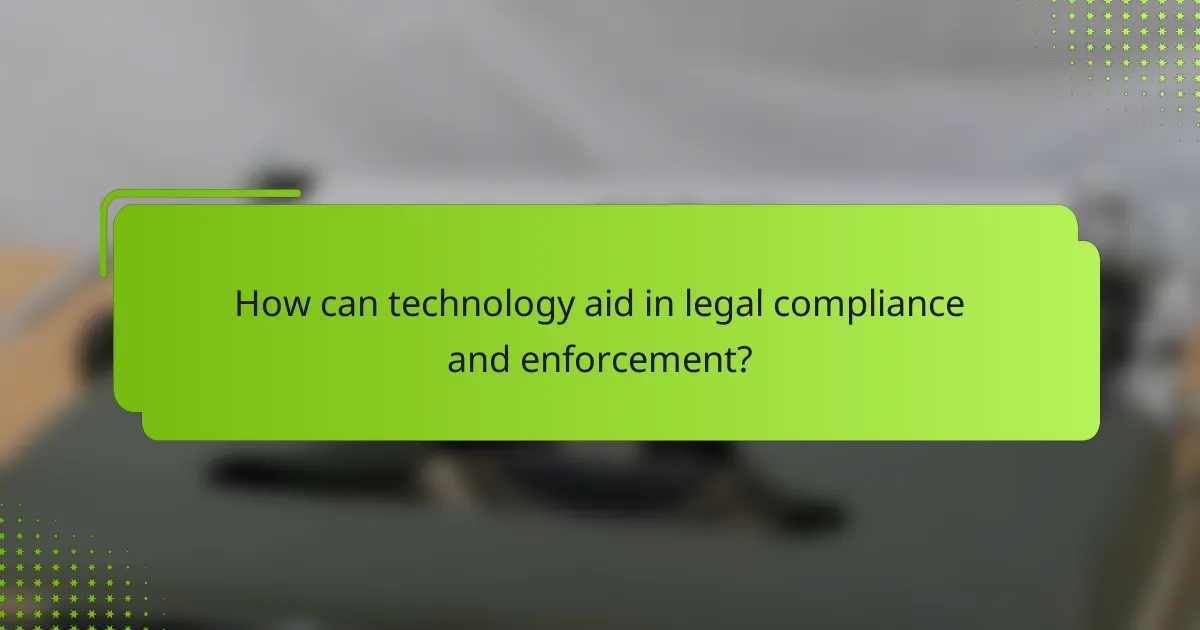
How can technology aid in legal compliance and enforcement?
Technology plays a crucial role in enhancing legal compliance and enforcement by automating processes, improving accuracy, and increasing transparency. Tools such as compliance management software and blockchain technology are particularly effective in streamlining operations and ensuring adherence to regulations.
Compliance management software
Compliance management software helps organizations monitor and manage their adherence to legal standards and regulations. These tools typically include features for tracking compliance activities, documenting processes, and generating reports, which can simplify audits and inspections.
When selecting compliance management software, consider factors such as user-friendliness, integration capabilities with existing systems, and the ability to customize workflows. Popular options often provide templates for various regulations, which can save time and reduce errors.
Blockchain for transparency
Blockchain technology enhances transparency in legal compliance by providing a secure and immutable record of transactions and activities. This decentralized ledger allows for real-time tracking of compliance-related processes, making it easier to verify adherence to regulations.
Implementing blockchain can be particularly beneficial in industries like finance and supply chain, where traceability is crucial. Organizations should evaluate the costs of integration and the technical expertise required, as these factors can influence the overall effectiveness of blockchain solutions in compliance efforts.
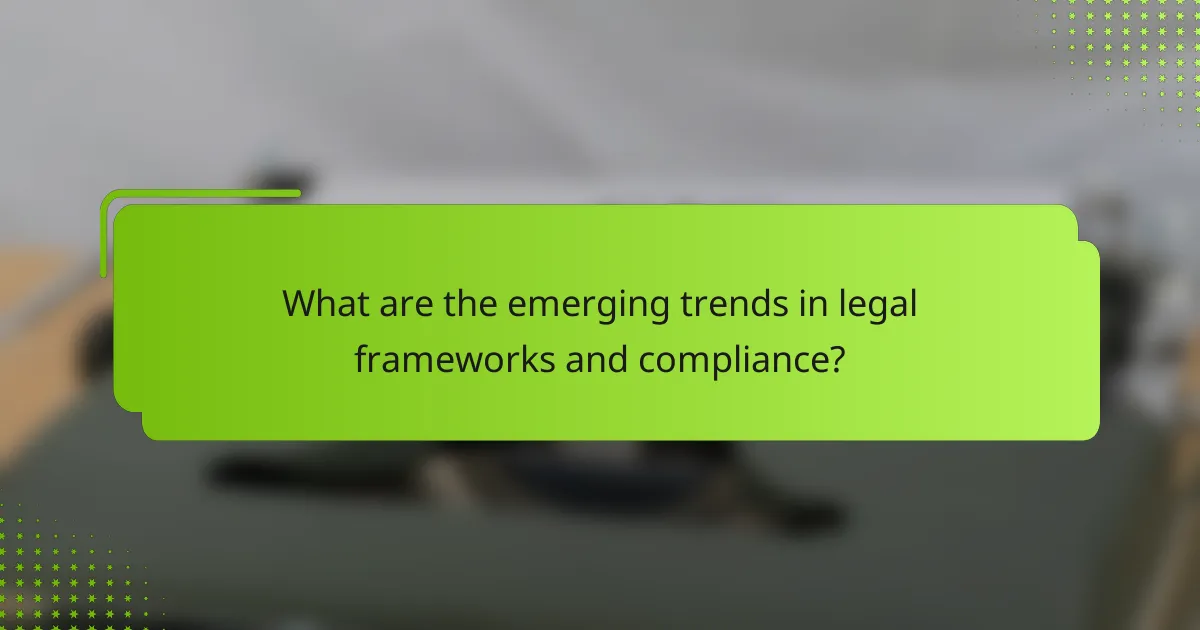
What are the emerging trends in legal frameworks and compliance?
Emerging trends in legal frameworks and compliance focus on adapting to rapid technological advancements and increasing regulatory scrutiny. Key areas include automation, data privacy, and cross-border compliance, which are reshaping how organizations approach legal obligations.
Increased automation
Increased automation in legal frameworks streamlines compliance processes, reducing manual effort and minimizing errors. Technologies such as artificial intelligence and machine learning are being integrated into compliance systems to enhance efficiency and accuracy.
Organizations are adopting automated tools for tasks like document review, risk assessment, and reporting. This shift allows legal teams to focus on strategic decision-making rather than routine administrative tasks. For example, automated compliance software can quickly analyze large volumes of data to identify potential regulatory breaches.
However, while automation offers significant benefits, it also presents challenges. Companies must ensure that automated systems are properly calibrated to comply with local regulations, which can vary widely. Regular audits and updates are essential to maintain compliance and address any emerging legal issues.
